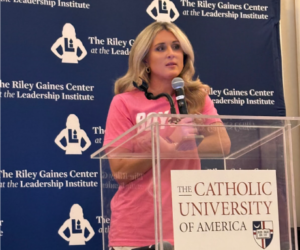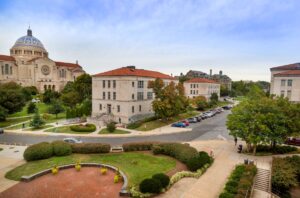Can Catholic U Be More Environmentally Friendly?
By Christopher Vitale
Editor’s Note: Catholic University is one of the most “green” campuses in Washington, D.C. according to the Office of Planning (OP) and Department of Energy & Environment (DOEE). Catholic U has reduced carbon emissions by 50% through the use of renewable energy. The university also operates 1,500 solar panels to displace carbon dioxide. Even with these statistics, students are still expressing their concerns with Catholic University’s environmental friendliness; will changes be made to continue the progress towards a greener campus?
For the past several weeks, students who eat in the Student Restaurant on the third level of the Pryzbyla Center have noticed that all reusable dishware and utensils have been replaced by disposable paper and plastic alternatives, striking some concerns within the student population about the environmental and monetary implications.
Dining Services Supervisor Diamond Bennett explained that the dishwasher malfunctioned and Dining Services does not have the parts to fix it currently.
Though it has been two weeks since the malfunction, the delivery of parts has taken some time. She noted that it has been about two weeks since the malfunction occurred, and upon questioning about what is being done to resolve the issue, she stated that the required materials to bring the dishwasher back to normal function have been ordered and that Dining Services is anticipating the arrival of the parts this Thursday. Once they arrive, employees should be able to correct the troubles the dishwasher is undergoing and have it up and running again.
In the wake of these developments to the Student Restaurant, freshman students Isabella Ramon and Ali-Jae Nicolai have voiced their concerns about the negative effects of the switch.
“I wouldn’t call myself an environmentalist, but I am aware of how an excessive amount of paper products can affect our environment,” Ramon said. “I think Catholic should consider this a major issue and attend to it quickly so that we can go back to reusable dishes and utensils.”
Ramon is among a number of students who are wondering why it would take several weeks to acquire these materials and that Catholic U officials should be making this more of a priority.
“Hopefully soon we can go back to clean dishes and not be wasting so much paper and plastic for our dining needs,” added Nicolai.
Additionally, these disposable products cost money and are an unnecessary contribution to Catholic U’s spending and budget. The paper/plastic waste in the Student Restaurant as well as in waste bins in other parts of the Pryzbyla are not being recycled, and students have noticed that employees deposit garbage from both the trash and recycling bins into the same waste container for disposal.
As far as other environmental concerns go, some have noticed that most office and hallway lights in buildings as well as lights in and at the Pryzbyla stay on throughout the night despite not being in use. This seems unnecessary and encourages the conclusion that more can be done on Catholic U’s part to foster environmental care.
Of course, Catholic has been making recent efforts to be more eco-friendly despite the dishwasher breakage complications, and Bennett also assured that the university is trying to “go green,” which is evident in the removal of straws from the Student Restaurant in favor of sipping lids. Nevertheless, perhaps more can be done to really push the sense of being “green.” Surely the university community could take a few more steps towards a common goal of environmental health.







